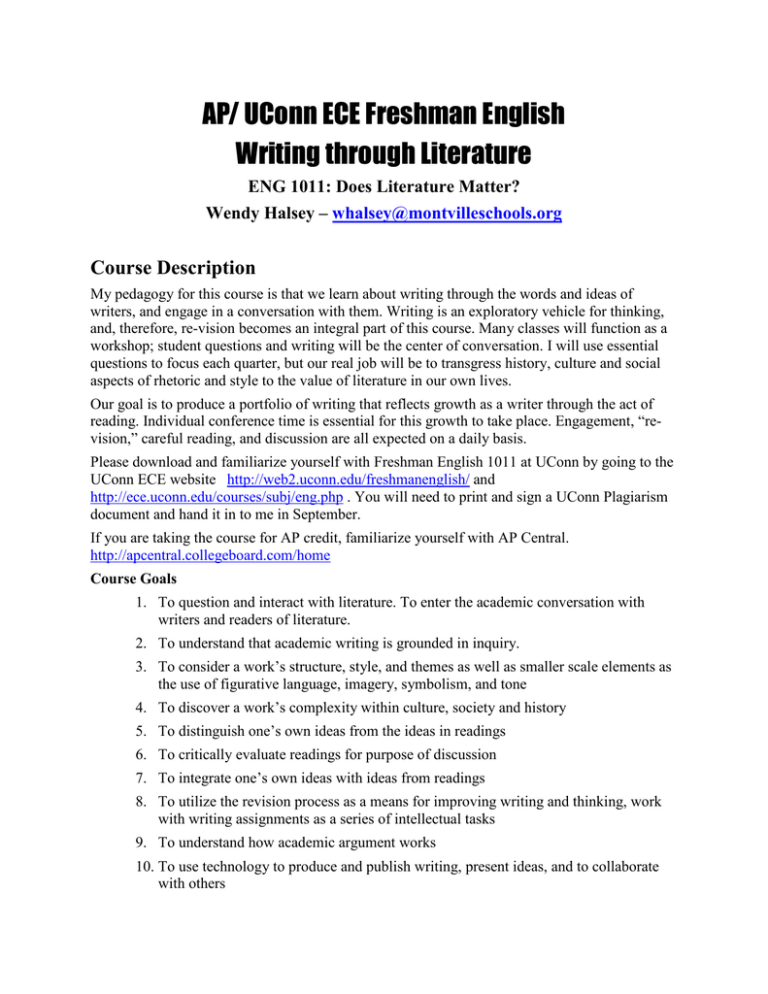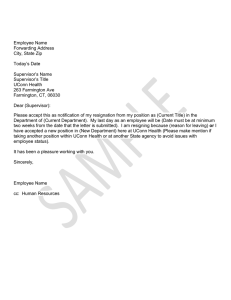AP/ UConn ECE Freshman English
advertisement

AP/ UConn ECE Freshman English Writing through Literature ENG 1011: Does Literature Matter? Wendy Halsey – whalsey@montvilleschools.org Course Description My pedagogy for this course is that we learn about writing through the words and ideas of writers, and engage in a conversation with them. Writing is an exploratory vehicle for thinking, and, therefore, re-vision becomes an integral part of this course. Many classes will function as a workshop; student questions and writing will be the center of conversation. I will use essential questions to focus each quarter, but our real job will be to transgress history, culture and social aspects of rhetoric and style to the value of literature in our own lives. Our goal is to produce a portfolio of writing that reflects growth as a writer through the act of reading. Individual conference time is essential for this growth to take place. Engagement, “revision,” careful reading, and discussion are all expected on a daily basis. Please download and familiarize yourself with Freshman English 1011 at UConn by going to the UConn ECE website http://web2.uconn.edu/freshmanenglish/ and http://ece.uconn.edu/courses/subj/eng.php . You will need to print and sign a UConn Plagiarism document and hand it in to me in September. If you are taking the course for AP credit, familiarize yourself with AP Central. http://apcentral.collegeboard.com/home Course Goals 1. To question and interact with literature. To enter the academic conversation with writers and readers of literature. 2. To understand that academic writing is grounded in inquiry. 3. To consider a work’s structure, style, and themes as well as smaller scale elements as the use of figurative language, imagery, symbolism, and tone 4. To discover a work’s complexity within culture, society and history 5. To distinguish one’s own ideas from the ideas in readings 6. To critically evaluate readings for purpose of discussion 7. To integrate one’s own ideas with ideas from readings 8. To utilize the revision process as a means for improving writing and thinking, work with writing assignments as a series of intellectual tasks 9. To understand how academic argument works 10. To use technology to produce and publish writing, present ideas, and to collaborate with others Reading: Time management and active reading skills are essential. We read at a very fast pace, but we also read for details and to ask questions. We read fiction, nonfiction, poetry, film, video and art – I consider all forms of visual texts as a “reading.” In order to write critically about a text, we must engage with it, grapple with it, ask questions of it. Active participation in class is mandatory; active reading is necessary for participation. Consider reading and viewing the texts that we are working with more than once! Reading Quizzes reward time management skills. If you are following our reading schedule, then these quizzes will just become review. If students are straggling, these quizzes will hopefully remind everyone that in order for class to be successful, ALL students must be on the same page. Writing: We write! Students always have a writing assignment that they are working on in conjunction to the literature we are reading. Writing assignments are sequenced, formal and informal, creative and analytic; all geared to feed the larger assignment at the end of each quarter. Re-vision is the heart of this course. We will be using Rewriting by Joseph Harris as a model for our sequenced writings. Students may purchase a copy of Harris on Amazon.com, but this is not mandatory. In class writing often reflects questions about our reading. “Listening with a Pen” during discussions is a way to revisit discussion at a later time and reflect on it. Socratic Seminars will ask you to consider your own questions and report out to the class. The Harkness method of formal discussion requires all to participate. Reflection is a major component to learning, so each quarter students assess their writing, reading, participation, and preparation skills in order to evaluate their growth. “Texts live through the work of readers…students will have to become coauthors: they will construct a ‘reading’ that makes the text meaningful” (UConn Course Description). We will work in small writing groups for peer critiquing and revision. Habits of Mind: from “Awakening Genius” by Thomas Armstrong Curiosity –desire to know about the world Playfulness – desire to engage and play with ideas Imagination- allow the creative Creativity – allow the imaginative Wonder – allow astonishment Wisdom- entertain knowledge and responsibility Inventiveness – engagement and grappling – finding new connections to texts Vitality –vibrancy and eagerness to learn Sensitivity – of oneself and others Flexibility - adapt to situations, expectations and demands Humor – don’t take everything so seriously! Joy – Find Happiness in Learning Grading: During the first two quarters, I allow students to re-write essays as many times as they feel necessary to gain the skills they need to succeed. The last two quarters, students will have to come to me for comments and suggestions before the essay is due (college reality). An “A” reflects commitment and ability to reflect on learning process. Essays show depth of inquiry, thought, and originality. Class time reflects effort and integrity. Attendance in class and commitment to rigor is demonstrated here. Grading Scale -100-90 A -89-80 B -79-70 C -69-60 D -59-0 F For UConn credit, anything below a 74 / C- will become an automatic Audit on your transcript. WHAT DOES AN “A,” “B,” “C,” etc., REALLY MEAN? “A” Excellent Work; this student • Provides points for discussion/debate which no one had thought of before • Adds significant new insights into the topic at hand • Asks pointed and challenging questions that stimulate other questions • Stimulates critical thinking imaginative and realistic enthusiasm, interest and curiosity • Brings in relevant outside experience related directly to discussions/material • Persuasively argues a point and changes the opinions of classmates • Displays logical outside-the-box thinking • Solves problems from multiple perspectives • Displays professional communication skills • Intuitively understands and shares insights from “between the lines” “B” Good to Very Good Work; this student • Presents useful knowledge in depth clearly and concisely • Is willing to defend and debate a position when appropriate; respectfully challenges ideas when disagrees • is a good team player in small groups; constructive leader or facilitator • Actively and consistently contributes information to a discussion • States a point from the material, then develops its meaning in more detail • Is willing to ask questions when a point is unclear; comes up with supporting ideas • Thinks between the lines; sees implications • Contributes logical, well documented recommendations • Applies outside knowledge • Plays “devil’s advocate” in a useful manner “C” Average Work; this student • Pays attention and offers supporting data to discussions • Participates in small group discussions at the same level as others in the group • Offers some thoughts, ideas, questions each class period • Is attentive listener and responds in a professional manner • Has read the material for the day and is generally prepared for class • Answers questions correctly when called upon “D” Below Average Work; this student • Repeats what has already been said in class • Is obviously not well prepared for the class • Makes comments that do not move analysis forward; doesn’t ask for help when needed • Takes weak or incomplete notes; displays a generally negative attitude • Misses obvious points • Offers only limited participation in small group discussions • Packs up to leave before the end of class • Demonstrates a lack of understanding of material “F” Poor Work; this student • Does not participate in classroom discussion or small group discussion • Talks to neighbors during presentations by classmates or teacher; passes notes • Takes very weak or no notes • Is late or disruptive in class (or other such unprofessional behavior) • Works on homework for another class, checks Facebook, texts, etc., during class time • Does not listen to others; sleeps or dozes off; is disrespectful to colleagues • Is unreceptive to the consideration of alternative approaches, dogmatic and close-minded • Asks questions for which he or she already knows the answer • Acts as a free-rider in small group activities Course Policies: Academic Integrity: as a UConn student at Montville High School, you are a model and mentor for all other students. You are curious, dependable, and take your education seriously. As a UConn student, this course expects all students to act in accordance with the Guidelines for Academic Integrity at UConn. The guidelines can be found at http://www.dosa.uconn.edu. Click on “Student Resources” then “The Student Code,” then Appendix A: Academic Integrity in Undergraduate Education. Behavior in class: Respect of the learning environment is paramount. When teacher is speaking, you are listening and taking notes. When other students are presenting or speaking, you are respectful and do not interrupt. When working in small groups, you stay centered on the task, and offer as much of yourself and your intellect to others. You are willing to take risks, share and remain an active, integral part of this learning team. Students are expected to conduct themselves in accordance with UConn’s Student Conduct Code: http://www.community.uconn.edu/student_code.html Plagiarism Policy—We will follow the guidelines of the “Freshman English Program Statement on Plagiarism.” Please read this statement, found at http://freshmanenglish.uconn.edu/documents/Plagiarism%20Statement%20Aug%202012.pdf, and notify your teacher if you have any concerns about your ability to conform to these guidelines. Print out a copy of this statement and sign and return to your teacher. We can certainly review and discuss proper procedure for quoting, paraphrasing, etc., as necessary, until you are comfortable. Please see the UConn Library’s “Research 101” tutorial for details: http://www.lib.uconn.edu/instruction/tutorials/research/. Use of technology and media: We request that you challenge yourself. If you are comfortable with Powerpoint, try Prezi. Use the UConn databases for research. Understand citation. Use Owl Purdue Writing Lab if you have questions. You may bring your own personal laptop to class. Cell phones can be used for educational purposes only. No texting. Information Literacy: Many of the texts we “read” in this course are on the internet. We access museums, news media, You tube videos, art work, music and podcasts, to name a few. Students will broaden their skills of evaluating and utilizing the world wide web for educational purposes. We will also incorporate class blogs and shared folders for extending learning to outside the walls of the school. Preparation for class: Reading and writing are often preparation for class. You must complete what is assigned or take a zero. Class is based on discussion and knowledge – you will need both to succeed. If you are not prepared, you can not intellectually banter with us. Education is a privilege. Attendance, submission and tardiness: MHS policy on absences is clear. Twelve unexcused absences for a year course. We would suggest that this is far too many if you are involved in a thought provoking college education. Chances are you will not receive college credit if you miss twelve classes. If you are legitimately absent, please email the teacher for missed material. You are still required to be prepared for the next class. If an essay or presentation is due when you are absent, you still need to submit your assignment via email to your professor. Tardiness is just laziness. Don’t keep the learning community waiting! School policy – 3 tardys = 1 absence Policy on Late Work: Late work will be deducted 5 points a day. After one week, assignment will become a zero. Policy on course cancellations due to weather: Weather is not a free day. You are still required to be prepared for class when we reconvene. Academic Accommodations: Discuss these issues with your professors. Instructor Policy for religious observations – Same as Montville High School Academic Calendar and Course Schedule: Each quarter you will be required to complete a presentation and an essay of academic inquiry. The essay will be due at least a week before the quarter ends for grading purposes. Please feel free to hand in drafts before the due date. Texts and Materials In a college level course, students should consider purchasing their own copies of novels and plays. We have multiple copies of most of the titles on the list, but annotating school property is frowned on, and I like annotating. Some of the books are also available through Questiaschool.com. Preliminary list of novels, drama, anthologies, and texts: Literature and Its Writers Fifth Edition compiled by Ann and Samuel Charters, Bedford/St. Martin's, 2010 Rewriting by Joseph Harris, Utah State Univ. Press, Logan, Utah, 200 Waiting for Godot by Samuel Becke King Lear by William Shakespeare or Hamlet, Prince of Denmark A Thousand Acres by Jane Smiley or Rosencrantz and Guildenstern are Dead by Tom Stoppard Beowulf ed. By Seamus Heaney Grendel by John Gardner Frankenstein by Mary Shelley Brave New World by Aldous Huxley or Clockwork Orange by Anthony Burgess or Never Let Me Go by Kazuo Ishiguro Oedipus Rex by Socrates Crime and Punishment by Fyodor Dostoevsky Kite Runner by Khaled Hosseini As I Lay Dying by William Faulkner Handmaid’s Tale by Margaret Atwood Man’s Search for Meaning by Viktor Frankel Haroun and the Sea of Stories by Salman Rushdie Supplemental Readings: Selected short stories and poetry from Literature and Its Writers Non- fiction articles selected from Ways of Reading, The New Humanities Reader, From Inquiry to Academic Writing, The Bedford Reader, and periodicals such as The Atlantic, The New Yorker and Harper’s.

